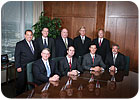

Adesta’s management team pictured from left to right. Front row: Lee Fintel, vp project development; Greg Benak, vp, general counsel and secretary; Jim Kawamoto, senior vp, CFO; and John Huerter, vp and treasurer. Back row: Bruce Downing, vp operations; Rob Hile, vp business development; Tom Gillette, vp security operations; Bob Sommerfeld, president; and Mark Berner, vp support services.
“Our company generally had roots in data and telecommunications networks. We got into the physical security business in 1991. Beginning in 2001, 2002, the convergence of networked security systems was really — from our perspective at least — starting to gain momentum,” says Robert Sommerfeld, president of Adesta. That’s when the company really started to focus in that space according to Sommerfeld and Robert Hile, Adesta’s vice president of business development. Today, roughly 60 percent of Adesta’s business is related to the sale, design, installation and service of CCTV, access control and integrated systems.
Because the company’s original background was communications, Adesta has quite a large staff (more than 20) of IT-certified and network-knowledgeable employees on board.
In addition to IT certifications and training, the company has employees certified in Level I and II Fire Alarm Certification from NICET, Certified Security Project Manager, Certified Protection Professional, and several major manufacturers’ certifications.
“We have accomplished ample cross training and cross pollination between IT and security people. We have a combination of data networks, IT and information services people, combined with security technicians, installers, and application engineers,” Sommerfeld says.
“I don’t really consider this a ‘security’ industry any more — it’s a converged systems industry. You have to handle networking, communications, wireless, fiber and customer’s expectations,” Hile says.
To help achieve its goals, Adesta is broken up into three divisions: security, communications and broadband. Its biggest growth in the last two years has come from the security side of its business, but Adesta considers itself a systems integrator that strives to offer complete turnkey systems for its customers. According to the company, it has deployed more than two million fiber miles in more than 140 metropolitan and rural areas and completed more than 800 large, integrated electronic security systems.
In June 2006, Adesta acquired Prime Networks of Atlanta, which strengthened its ability to offer wireless communications products in the physical security space, and allowed them to open a broadband division. “The expertise we gained helps us deploy these wireless networks in challenging environments in transportation systems and municipal projects that are being brought to the security environment,” says Glenn Shaffren, vice president of Broadband Networks at Adesta.
Customers appreciate the “one-stop” solution. Adesta had $46.1 million in converged security project revenue for 2006 and 240 new project starts for the year.
Sidebar: At a Glance
Adesta, LLC, Omaha, Neb.Number of Employees:330+
Revenue:$51 million (estimated) in 2007, an 11 percent increase over 2006
Market Focus:Government/Transportation/Utilities


